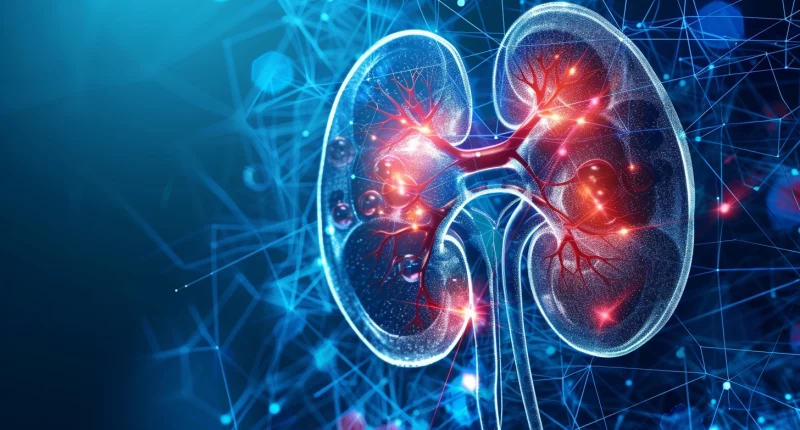Chronic kidney disease
What’s that?
Renal failure is a sudden or gradual, partial or complete impairment of the kidneys’ filtration, secretory, and excretory functions. It can develop for many reasons. It is characterized by changes in the water-electrolyte balance in the body and increasing intoxication, leading to dysfunction of other internal organs with the development of irreversible consequences up to death.
About the disease
Depending on the peculiarities of the pathological process, there are two types of renal failure – acute and chronic. A sharp decline in organ functions is said about acute renal failure. With the gradual development of the pathological process and a decrease in kidney activity, failure is characterized as chronic.
The basis of chronic kidney disease (CKD) is the gradual death of kidney cells with the replacement of parenchymatous tissue by connective tissue. A decrease in function correlates with the pathological process’s volume and rate of spread. More often, CKD develops against the background of a long course of kidney disease. The peculiarity of this form is the irreversibility of changes. The number of patients suffering from it increases annually.
Renal failure affects the entire body: leads to changes in the composition and rheology of the blood (anemia, clotting disorders), dysfunction of the heart and blood vessels (hypertension, heart failure), digestive organs, nervous system, immunity, musculoskeletal system, can cause the development of life-threatening conditions (purulent-septic processes, internal bleeding).
Types of kidney failure
Classification renal failure is based on the factors that cause a sharp decrease in renal function. Depending on the localization of the underlying pathological process, the following forms are distinguished:
- Prerenal. It is not associated with renal disease and often develops due to severe hemodynamic disturbances.
- Renal. It is caused by the simultaneous death of many nephrons due to exposure of the organ to toxins or ischemia.
- Postrenal. Occurs against the background of disorders of urine passage due to obstruction of the urinary tract.
Chronic renal failure has four stages depending on the glomerular filtration rate and albumin level. It helps the doctor to determine the proper treatment.
Symptoms of kidney failure
Symptoms of acute renal failure are layered on top of the manifestations of the underlying disease that led to kidney dysfunction. It can be trauma, poisoning, etc.
- The clinic of acute renal failure in the initial stages includes nonspecific symptoms (weakness, fatigue, nausea, decreased appetite).
- Subsequently, there is a significant decrease in diuresis (less than 0.5 liters of urine per day) with severe abnormalities in urine composition.
- Metabolic acidosis is manifested by symptoms of intoxication (diarrhea, nausea, vomiting). At this stage, complications in the form of coma, infectious inflammatory lesions of internal organs, and bleeding are possible.
With a favorable development of events, renal function is restored. The first sign of improvement in the patient’s condition is an increase in diuresis (up to 2 or more liters per day). Full recovery takes 6-12 months.
Symptoms of chronic renal failure manifest themselves when there is a significant decrease in the rate of glomerular filtration. Up to this point, clinical signs of the disease are subtle and include:
- general weakness;
- rapid fatigue;
- dry mouth.
Worsening dysfunction exacerbates the above symptoms, resulting in:
- pronounced weakness;
- drowsiness;
- intense thirst;
- dry and pale skin.
At the terminal stage, there is intoxication of the body with metabolic products, resulting in the patient’s skin acquiring a yellow-gray shade, and the person notes problems with concentration and performance of habitual actions. Often during this period, there are such signs of renal failure:
- severe itching of the skin;
- tremors of the limbs;
- muscle weakness;
- bone fragility;
- characteristic ammonia breath odor;
- infectious-inflammatory complications, pathologies of internal organs;
- disturbing the patient’s consciousness to the point of coma.
Causes of kidney failure
CKD is caused by diseases that affect both or only one kidney. These include:
- nephritis in systemic connective tissue diseases;
- amyloidosis;
- polycystic;
- glomerulonephritis;
- chronic pyelonephritis;
- nephroangiosclerosis and others.
Diagnosis
Diagnostic process is determined by a nephrologist based on the underlying pathology – the one that provoked the development of renal failure. Signs of acute form is a significant decrease in diuresis. In this case, it is carried out:
- Biochemical analysis of blood (particular attention should be paid to the indicators of electrolytes, creatinine, and urea, which track the severity of acute renal failure);
- Ultrasound of the kidneys and bladder with Doppler ultrasound (according to its results determine the localization of the damaged link of the urinary tract);
- Sometimes, pelvic catheterization is performed to exclude renal and postrenal renal insufficiency.
Diagnosis of CKD involves laboratory examination with general and biochemical blood tests, urinalysis, and Rehberg’s test. Ultrasound examination of kidneys and renal vessels may reveal dystrophic tissue changes and disorders of intraorgan blood flow.
Treatment
Treatment of chronic kidney disease is always complex. In both acute and chronic forms of the disease, the focus is on the pathology that underlies the kidney dysfunction.
Conservative methods
Conservative treatment aims to control the underlying disease, correcting and slowing the progression of pathological changes in the kidneys and other organs. Therapeutic measures in acute renal failure are aimed at detoxifying the body, restoring electrolyte balance, normal diuresis, and preventing complications. Drugs are selected by the results of the examination. To reduce the load on the urinary system, the patient is prescribed a diet with restrictions on fluids, proteins, and potassium.
The treatment of chronic renal failure focuses on the underlying pathology and symptomatic therapy to slow the damage to renal tissue. Symptomatic treatment includes the prevention of anemia, osteodystrophy, hyperphosphatemia, heart failure, and other potential complications. There are also dietary restrictions – the patient is prescribed a low-protein, salt-free diet.
Extracorporeal methods
Severe intoxication is eliminated using hardware methods of removing toxins from the bloodstream (plasmapheresis, hemosorption). With a significant decrease in renal function, resort to hemodialysis. Patients with a severe course of the disease may be recommended regular hemodialysis 2-3 times a week. To achieve a vascular access for a regular hemodialysis, surgeons perform arterio-venous fistula or graft surgery.
Surgical treatment
Surgical treatment is required for people with acute renal failure caused by extensive trauma, wounds, burns, and urinary tract obstruction. The method and procedure of surgery are selected individually.
If slowing the progression of chronic kidney disease is not possible, a kidney transplant is recommended for the patient.
All these treatment options are available in more than 680 hospitals worldwide (https://doctor.global/results/diseases/chronic-kidney-disease). For example, Arteriovenous (AV) fistula surgery can be done in 38 clinics across Germany for an approximate price of $7.4 K (https://doctor.global/results/europe/germany/all-cities/all-specializations/procedures/arteriovenous-av-fistula-surgery).
Rehabilitation
Persons suffering from CKD should be observed in the dispensary group with a therapist or nephrologist. Examinations with the frequency prescribed by the doctor will help diagnose the deterioration of the kidneys promptly, the beginning of the progression of the pathological process, and take all measures to normalize the person’s condition.
Rehabilitation measures for people with kidney disease depend on what causes the condition. For several weeks after the recovery of kidney function, the patient should be under the close supervision of a doctor in the hospital. When the person’s condition no longer causes concern, he is discharged under outpatient observation with recommendations for adequate rest, a balanced diet with protein and salt restriction, and rest.

